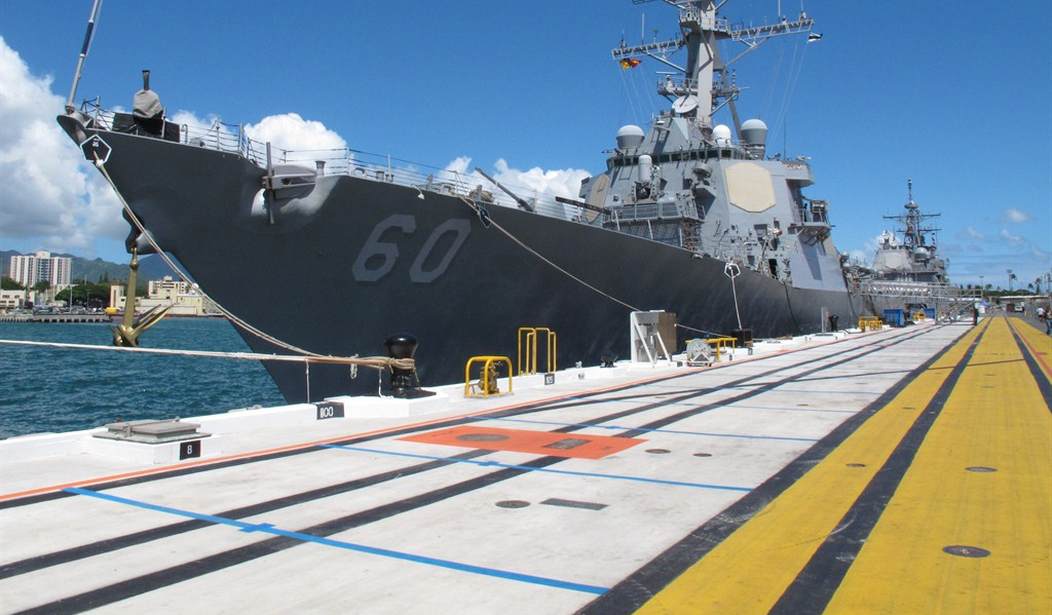China's defense spending will balloon to $233 billion in 2020, up from $123 billion in 2010, and North Korea is testing nukes and ICBMs. What happened to our pivot to the Asia-Pacific region? There’s been much talk about a strategic pivot over the last eight years. Unfortunately, there’s been far too little action. In all fairness, Europe and the Middle East have required attention, and corresponding resources. However, in the meantime, China continues to quietly build more leverage over our strategic partners in the region.
We made the correct decision to pivot to the Pacific because of the unrelenting growth of the Asian economies, population and security capabilities. The idea was that after ending the persistent wars in Iraq and Afghanistan, the U.S. would focus more of its time, attention and security resources on the Pacific region. That inevitability has not gone away.
Instead, we’ve been recently distracted by a politically-motivated, overblown “threat” of a resurgent Russia. Russia has a large naval base and predominant ethnic presence in the Crimea, which was actually transferred from Russia to Ukraine in 1954. We were surprised and appalled at Putin’s move to protect his strategic assets…really?
We certainly have a robust understanding of the friction points in Europe: energy for the NATO countries and warm-water ports for the Russians. Ironically, or fortuitously, the rise of ISIS is binding many adversaries.
The smart policy-makers are choosing between the least-bad options. The idealists are afraid of aligning with those that are not perfect, while the realists are decisively taking advantage of these opportunities and shaping the shifting alliances.
Again, we understand the complexities, strengths and weaknesses in Europe. The actions are predictable and can be anticipated. We do not have that kind of clarity, or cooperation, in the Asia-Pacific Region.
Recommended
We don’t have a collective appreciation of the friction points in the Asia-Pacific region. They are very different than Europe and the Middle East.
- Asian fishing rights are as fundamental as energy sovereignty.
- 200-mile Exclusive Economic Zones in the overlapping island nations of the Pacific is a Rubik’s Cube of alliances.
- The China-North Korea nexus is complex, dangerous, and unpredictable.
The Asia-Pacific region is ripe for engagement and consolidation of security agreements. We have five separate defense cooperative agreements with various and individual Asian nations, but no comprehensive strategy that produces in-depth understanding of the region.
The effort expended on the Trans Pacific Partnership (TPP) would have been better spent on a foundation for a meaningful security cooperation agreement. But, we missed the boat with that one, and have put our Asia-Pacific strategy “in irons.”
The vastness of the Pacific requires big thinking. The US Pacific Command covers roughly 100 million square miles, or 52% of the earth’s surface. The foundation of any security cooperation and engagement in this part of the world has to be maritime, long-haul aviation...and immense.
Having just two numbered fleets (3rd Fleet & 7th Fleet) assigned to this region is comically inadequate. When you factor ship maintenance and deployment rotation cycles the presence in the region is too thin to adequately shape/influence. It is certainly an inadequate foundation for a strategic pivot to counter increasing Chinese hegemony.
We have 9 Expeditionary Strike Groups (ESGs) on the books right now (down from 12), but only one assigned to the PACOM region. We need at least 7 assigned to the region. We’ve allowed former groups (ships) to retire and not replaced them. We are seriously slipping here.
ESGs are suited for projecting forward presence. Expeditionary groups are comprised mostly of forces designed to go ashore. When not actually engaged in destroying the enemy, Marines and sailors are excellent ambassadors. Amphibious ships are even less expensive than traditional surface fleet vessels…more bang for the buck. We don’t have enough ESGs.
We need wind in the sails of our Asia-Pacific strategy. Decisive action is required to gain and maintain the initiative and momentum. Having a persistent expeditionary presence in each of the four sub-regions (Northeast Asia, Oceania, South Asia, and Southeast Asia) will deliver multi-faceted benefits to regional stability and to U.S. interests.
China is being decisive…and strategic. In addition to dramatically increasing defense spending, Beijing has recently introduced a global rebranding operation consisting of six TV channels and a new media agency.
We need a commitment to maintaining superiority across the full spectrum of operations in the Asia-Pacific region. There’s far too much at stake.
Europe and the Middle East are getting all the attention now, and China (with North Korea) is taking full advantage of our relative indifference in the region. Let’s get out there with more of our best and brightest. We have no time to lose.
Ray McFall is a former senior advisor to State Department INL Bureau, and a former US Marine infantry officer.
























Join the conversation as a VIP Member